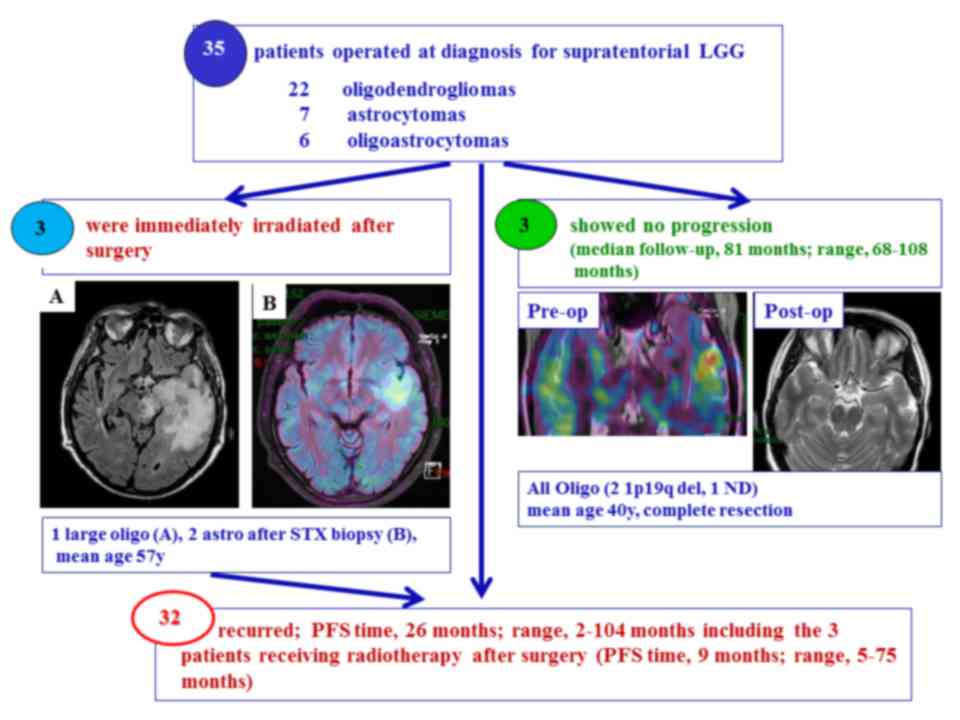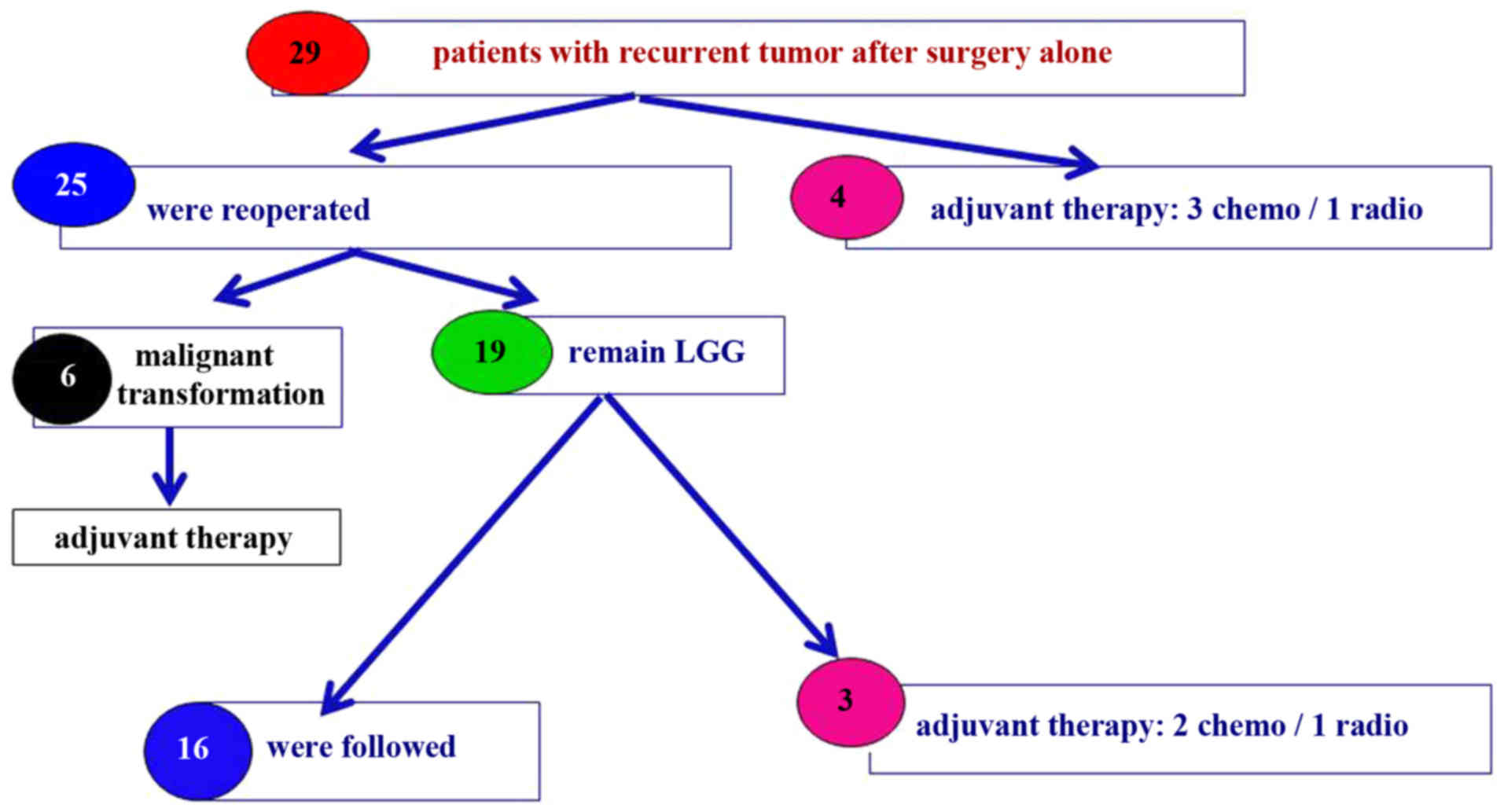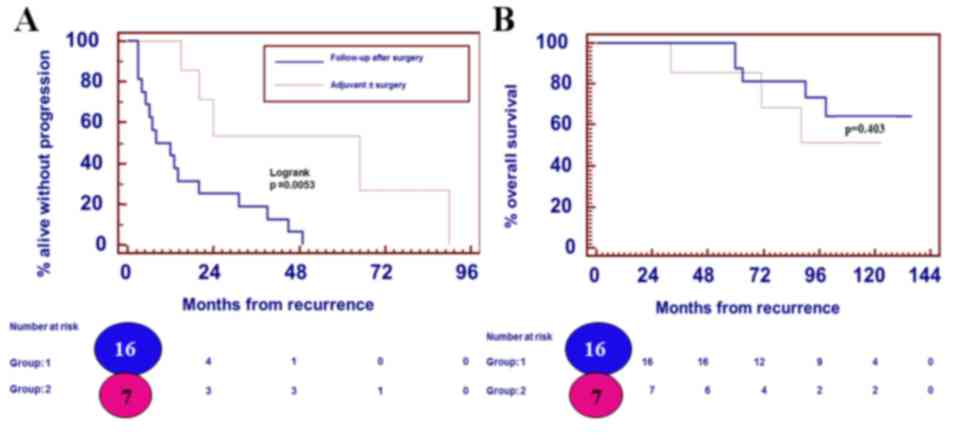|
1
|
Louis DN, Ohgaki H, Wiestler OD and
Cavenee WK: WHO Classification of Tumours of the Central Nervous
System. IARC Press; Lyon, France: 2007
|
|
2
|
Louis DN, Perry A, Reifenberger G, von
Deimling A, Figarella-Branger D, Cavenee WK, Ohgaki H, Wiestler OD,
Kleihues P and Ellison DW: The 2016 World Health Organization
classification of tumors of the central nervous system: A summary.
Acta Neuropathol. 131:803–820. 2016. View Article : Google Scholar : PubMed/NCBI
|
|
3
|
Chang EF, Smith JS, Chang SM, Lamborn KR,
Prados MD, Butowski N, Barbaro NM, Parsa AT, Berger MS and
McDermott MM: Preoperative prognostic classification system for
hemispheric low-grade gliomas in adults. J Neurosurg. 109:817–824.
2008. View Article : Google Scholar : PubMed/NCBI
|
|
4
|
Daniels TB, Brown PD, Felten SJ, Wu W,
Buckner JC, Arusell RM, Curran WJ, Abrams RA, Schiff D and Shaw EG:
Validation of EORTC prognostic factors for adults with low-grade
glioma: A report using intergroup 86-72-51. Int J Radiat Oncol Biol
Phys. 81:218–224. 2011. View Article : Google Scholar : PubMed/NCBI
|
|
5
|
Gorlia T, Wu W, Wang M, Baumert BG, Mehta
M, Buckner JC, Shaw E, Brown P, Stupp R, Galanis E, et al: New
validated prognostic models and prognostic calculators in patients
with low-grade gliomas diagnosed by central pathology review: A
pooled analysis of EORTC/RTOG/NCCTG phase III clinical trials.
Neuro Oncol. 15:1568–1579. 2013. View Article : Google Scholar : PubMed/NCBI
|
|
6
|
Gozé C, Blonski M, Le Maistre G, Bauchet
L, Dezamis E, Page P, Varlet P, Capelle L, Devaux B, Taillandier L,
et al: Imaging growth and isocitrate dehydrogenase 1 mutation are
independent predictors for diffuse low-grade gliomas. Neuro Oncol.
16:1100–1109. 2014. View Article : Google Scholar : PubMed/NCBI
|
|
7
|
Koekkoek JA, Dirven L, Heimans JJ, Postma
TJ, Vos MJ, Reijneveld JC and Taphoorn MJ: Seizure reduction in a
low-grade glioma: More than a beneficial side effect of
temozolomide. J Neurol Neurosurg Psychiatry. 86:366–373. 2015.
View Article : Google Scholar : PubMed/NCBI
|
|
8
|
Pallud J, Capelle L, Taillandier L,
Fontaine D, Mandonnet E, Guillevin R, Bauchet L, Peruzzi P,
Laigle-Donadey F, Kujas M, et al: Prognostic significance of
imaging contrast enhancement for WHO grade II gliomas. Neuro Oncol.
11:176–182. 2009. View Article : Google Scholar : PubMed/NCBI
|
|
9
|
Pignatti F, van den Bent M, Curran D,
Debruyne C, Sylvester R, Therasse P, Afra D, Cornu P, Bolla M,
Vecht C, et al: Prognostic factors for survival in adult patients
with cerebral low-grade glioma. J Clin Oncol. 20:2076–2084. 2002.
View Article : Google Scholar : PubMed/NCBI
|
|
10
|
Sanson M, Marie Y, Paris S, Idbaih A,
Laffaire J, Ducray F, El Hallani S, Boisselier B, Mokhtari K,
Hoang-Xuan K and Delattre JY: Isocitrate dehydrogenase 1 codon 132
mutation is an important prognostic biomarker in gliomas. J Clin
Oncol. 27:4150–4154. 2009. View Article : Google Scholar : PubMed/NCBI
|
|
11
|
Weiler M and Wick W: Molecular predictors
of outcome in low-grade glioma. Curr Opin Neurol. 25:767–773. 2012.
View Article : Google Scholar : PubMed/NCBI
|
|
12
|
Berger MS, Deliganis AV, Dobbins J and
Keles GE: The effect of extent of resection on recurrence in
patients with low grade cerebral hemisphere gliomas. Cancer.
74:1784–1791. 1994. View Article : Google Scholar : PubMed/NCBI
|
|
13
|
Gousias K, Schramm J and Simon M: Extent
of resection and survival in supratentorial infiltrative low-grade
gliomas: Analysis of and adjustment for treatment bias. Acta
Neurochir (Wien). 156:327–337. 2014. View Article : Google Scholar : PubMed/NCBI
|
|
14
|
Jakola AS, Myrmel KS, Kloster R, Torp SH,
Lindal S, Unsgård G and Solheim O: Comparison of a strategy
favoring early surgical resection vs a strategy favoring watchful
waiting in low-grade gliomas. JAMA. 308:1881–1888. 2012. View Article : Google Scholar : PubMed/NCBI
|
|
15
|
Smith JS, Chang EF, Lamborn KR, Chang SM,
Prados MD, Cha S, Tihan T, Vandenberg S, McDermott MW and Berger
MS: Role of extent of resection in the long-term outcome of
low-grade hemispheric gliomas. J Clin Oncol. 26:1338–1345. 2008.
View Article : Google Scholar : PubMed/NCBI
|
|
16
|
Zadeh G, Khan OH, Vogelbaum M and Schiff
D: Much debated controversies of diffuse low-grade gliomas. Neuro
Oncol. 17:323–326. 2015. View Article : Google Scholar : PubMed/NCBI
|
|
17
|
Soffietti R, Baumert BG, Bello L, von
Deimling A, Duffau H, Frénay M, Grisold W, Grant R, Graus F,
Hoang-Xuan K, et al: Guidelines on management of low-grade gliomas:
Report of an EFNS-EANO task force. Eur J Neurol. 17:1124–1133.
2010. View Article : Google Scholar : PubMed/NCBI
|
|
18
|
Nahed BV, Redjal N, Brat DJ, Chi AS, Oh K,
Batchelor TT, Ryken TC, Kalkanis SN and Olson JJ: Management of
patients with recurrence of diffuse low grade glioma: A systematic
review and evidence-based clinical practice guideline. J
Neurooncol. 125:609–630. 2015. View Article : Google Scholar : PubMed/NCBI
|
|
19
|
Nihashi T, Dahabreh IJ and Terasawa T:
Diagnostic accuracy of PET for recurrent glioma diagnosis: A
meta-analysis. AJNR Am J Neuroradiol. 34(944–950): S1–S11.
2013.PubMed/NCBI
|
|
20
|
Boele FW, Douw L, Reijneveld JC, Robben R,
Taphoorn MJ, Aaronson NK, Heimans JJ and Klein M: Health-related
quality of life in stable, long-term survivors of low-grade glioma.
J Clin Oncol. 33:1023–1029. 2015. View Article : Google Scholar : PubMed/NCBI
|
|
21
|
Suneja G, Alonso-Basanta M, Lustig R, Lee
JY and Bekelman JE: Postoperative radiation therapy for low-grade
glioma: Patterns of care between 1998 and 2006. Cancer.
118:3735–3742. 2012. View Article : Google Scholar : PubMed/NCBI
|
|
22
|
van den Bent MJ, Afra D, de Witte O, Ben
Hassel M, Schraub S, Hoang-Xuan K, Malmström PO, Collette L,
Piérart M, Mirimanoff R, et al: Long-term efficacy of early versus
delayed radiotherapy for low-grade astrocytoma and
oligodendroglioma in adults: The EORTC 22845 randomised trial.
Lancet. 366:985–990. 2005. View Article : Google Scholar
|
|
23
|
Youland RS, Brown PD, Giannini C, Parney
IF, Uhm JH and Laack NN: Adult low-grade glioma: 19-year experience
at a single institution. Am J Clin Oncol. 36:612–619. 2013.
View Article : Google Scholar : PubMed/NCBI
|
|
24
|
Ramakrishna R, Hebb A, Barber J, Rostomily
R and Silbergeld D: Outcomes in reoperated low-grade gliomas.
Neurosurgery. 77:175–184. 2015. View Article : Google Scholar : PubMed/NCBI
|
|
25
|
Buckner JC, Shaw EG, Pugh SL, Chakravarti
A, Gilbert MR, Barger GR, Coons S, Ricci P, Bullard D, Brown PD, et
al: Radiation plus Procarbazine, CCNU, and vincristine in low-grade
glioma. N Engl J Med. 374:1344–1355. 2016. View Article : Google Scholar : PubMed/NCBI
|
|
26
|
van den Bent MJ: Practice changing mature
results of the RTOG study 9802: Another positive PCV trial makes
adjuvant chemotherapy part of standard of care in low-grade glioma.
Neuro Oncol. 16:1570–1574. 2014. View Article : Google Scholar : PubMed/NCBI
|
|
27
|
Laack NN, Sarkaria JN and Buckner JC:
Radiation therapy oncology group 9802: Controversy or consensus in
the treatment of newly diagnosed low-grade glioma? Semin Radiat
Oncol. 25:197–202. 2015. View Article : Google Scholar : PubMed/NCBI
|
|
28
|
Baumert B, Mason W, Ryan G, Bromberg JE,
Van Den Bent MJ, Xuan KH, Brandes AA, Kantor G, Taphoom MJ, Hassel
MB, et al: Temozolomide chemotherapy versus radiotherapy in
molecularly characterized (1p loss) low-grade glioma: A randomized
phase III intergroup study by the EORTC/NCIC-CTG/TROG/MRC-CTU
(EORTC 22033–26033). J Clin Oncol. 31:(Suppl). 2007.
|
|
29
|
Fisher BJ, Hu C, Macdonald DR, Lesser GJ,
Coons SW, Brachman DG, Ryu S, Werner-Wasik M, Bahary JP, Liu J, et
al: Phase 2 study of temozolomide-based chemoradiation therapy for
high-risk low-grade gliomas: Preliminary results of radiation
therapy oncology group 0424. Int J Radiat Oncol Biol Phys.
91:497–504. 2015. View Article : Google Scholar : PubMed/NCBI
|
|
30
|
Martino J, Taillandier L, Moritz-Gasser S,
Gatignol P and Duffau H: Re-operation is a safe and effective
therapeutic strategy in recurrent WHO grade II gliomas within
eloquent areas. Acta Neurochir (Wien). 151:427–436. 2009.
View Article : Google Scholar : PubMed/NCBI
|
|
31
|
Schmidt MH, Berger MS, Lamborn KR, Aldape
K, McDermott MW, Prados MD and Chang SM: Repeated operations for
infiltrative low-grade gliomas without intervening therapy. J
Neurosurg. 98:1165–1169. 2003. View Article : Google Scholar : PubMed/NCBI
|
|
32
|
Wild-Bode C, Weller M, Rimner A, Dichgans
J and Wick W: Sublethal irradiation promotes migration and
invasiveness of glioma cells: Implications for radiotherapy of
human glioblastoma. Cancer Res. 61:2744–2750. 2001.PubMed/NCBI
|
|
33
|
Pallud J, Blonski M, Mandonnet E, Audureau
E, Fontaine D, Sanai N, Bauchet L, Peruzzi P, Frénay M, Colin P, et
al: Velocity of tumor spontaneous expansion predicts long-term
outcomes for diffuse low-grade gliomas. Neuro Oncol. 15:595–606.
2013. View Article : Google Scholar : PubMed/NCBI
|
|
34
|
Huse JT, Wallace M, Aldape KD, Berger MS,
Bettegowda C, Brat DJ, Cahill DP, Cloughesy T, Haas-Kogan DA, Marra
M, et al: Where are we now? And where are we going? A report from
the Accelerate Brain Cancer Cure (ABC2) low-grade glioma research
workshop. Neuro Oncol. 16:173–178. 2014. View Article : Google Scholar : PubMed/NCBI
|

















